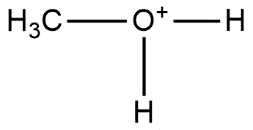Question
Question: Which of the following is not a nucleophile? A. \(C{{H}_{3}}{{O}^{-}}\) B. \({{H}_{2}}O\) C. \...
Which of the following is not a nucleophile?
A. CH3O−
B. H2O
C. CH3−OCH3
D. 
Solution
A nucleophile is generally made up of two words Nucleo and phile where Nucleo refers to nucleus and phile is a Greek word having the meaning love so nucleophiles are also termed as those substances which are nucleus loving.
Complete step by step answer:
- Nucleophiles are generally said to be electron-rich species i.e. those species which have a greater tendency to donate electrons. Due to the nature of donating electrons nucleophiles are kept in the category of Lewis bases as bases are those substances that can donate the H+ ions. Nucleophiles either carry a negative charge or are neutral in nature.
- The nucleophilic nature of any species describes the affinity of the species towards the positively charged nucleus. All molecules or ions which have a free pair of electrons or at least one pi bond can act as a nucleophile.
- Hence from the above discussion, we can consider that nucleophiles are a chemical species which have the tendency to donate electron pairs to form a chemical bond in a reaction, it can be negative or neutral in charge. From this definition, we can easily conclude that option D is not suitable with a definition of the nucleophile. So, the correct answer is “Option D”.
Note: Nucleophiles generally take part in the nucleophilic substitution reactions and during this reaction nucleophile becomes attracted towards a partial or full positive charge rather than this neutral nucleophilic reaction with solvents like water is known by the name solvolysis.
